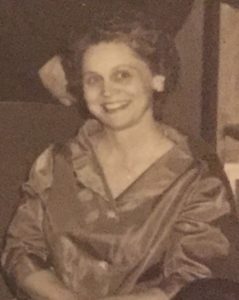My niece, Pamela Jeanne Stith, wrote this story.
Mary Sigrest Harrison –Momma– was never president of WMU, the Women’s Missionary Union, a fixture of the Baptist church. She never led a fund raiser for the PTA, never won Yard of the Month from the garden club. I’m not sure she’d even heard of the Junior League.

Momma, who was beautiful but not prissy, was a nurse at Holy Name of Jesus Hospital in Gadsden, AL, when she and Dad met. She was caring for his mother. One year after their first date, to the day, they were married.
I don’t think Momma knew much about economics. I don’t think she could discuss supply and demand or the GDP, but she never bounced a check, always stayed within her budget and reconciled her bank statement every month – to the penny – she liked to say.
To stay on budget she wrote the budget categories – Tithe, Rent, Food, Gasoline, and so forth on 3 x 5 cards and put each one in a mason jar. She and Daddy would cash the pay check on the first of the month and divide the money among the jars. They always seemed to have more month than money, especially for gasoline. When their car ran out of gas, they would push it off to the side of the road and leave it. The first of the month, they would fill the tank again and drive it until it ran out of gas. After a while the police caught on and told them they couldn’t leave their car just anywhere, they had to park it at their house. So when it started running on fumes they would stay close to home, so they wouldn’t have so far to push it.
When I would come home from school crying over my latest teenage heartache she would listen for a time and then say, “Go wash your face with cold water and set the table.” – or whatever needed to be done next.
And when I would come home from college complaining about a terrible class that I probably would not survive, She would say, “How many weeks are left in this semester? Six? Anybody can wrestle a bear for six weeks.” In her later years, when painful arthritis troubled her, I would suggest taking medicine.
“No,” she’d say, “It’ll be better tomorrow.”
She believed that. It was how she expressed her faith in Jesus Christ. In His love there was a better tomorrow. She’s with Him now, she died three years ago.
* * *
Mama invented GPS, but she didn’t get credit for it. Not the digital one, no, her navigation system was on 3 x 5 cards. That woman loved 3 x 5 cards. She was a true Southern woman, so her directions were landmark-based.
Number 1 Turn right at the church.
Number 2 Turn left after you pass Maude’s store.
Number 3 When you see the sugar maple just past the Burchette’s, slow down and turn left.
She even had lane assists.
Number 4 Get in the left lane when you pass the A&P.
Number 5 Turn left when you see the big red building where the Chinese restaurant used to be.
Number 6 Keep going, but not far.
My Dad worked for a big company but he always wanted a small business on the side. He bought a furniture stripping company and, later, opened a cloth store. Can you guess who ran them? Still, supper was on the table every night at 6, good food, good conversation, and laughter.
* * *
In looking through her things I didn’t find certificates or awards, no newspaper clippings or accolades. There are no blue ribbons or trophies that she received, but, oh, the things she gave, made with her hands: Toy soldiers and pearl angels, a crocheted scarf, a knitted hat, a quilt and memories of a closet filled with beautiful dresses.
She also gave me a keen sense of money management and, more important, she gave all of us an attitude of determination and optimism.
It’s okay to sorrow over sad things, but then it’s time to wash your face in cold water and move on. Difficult times won’t last forever and someday all of our difficult times will end – it will be better tomorrow.
Maybe you know someone like Mamma. Someone who doesn’t win the awards, or received much recognition. You should tell them how special they are. We told Mamma. We told her she was the sweetest, kindest, most loving woman we had ever known.